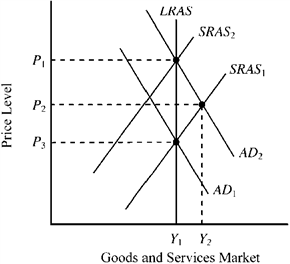Exam 15: Stabilization Policy, Output, and Employment
Exam 1: The Economic Approach185 Questions
Exam 2: Some Tools of the Economist204 Questions
Exam 3: Demand, Supply, and the Market Process339 Questions
Exam 4: Supply and Demand: Applications and Extensions268 Questions
Exam 5: Difficult Cases for the Market, and the Role of Government134 Questions
Exam 6: The Economics of Political Action161 Questions
Exam 7: Taking the Nations Economic Pulse222 Questions
Exam 8: Economic Fluctuations, Unemployment, and Inflation182 Questions
Exam 9: An Introduction to Basic Macroeconomic Markets219 Questions
Exam 10: Dynamic Change, Economic Fluctuations, and the Ad--As Model193 Questions
Exam 11: Fiscal Policy: The Keynesian View and the Historical Development of Macroeconomics112 Questions
Exam 12: Fiscal Policy: Incentives, and Secondary Effects154 Questions
Exam 13: Money and the Banking System198 Questions
Exam 14: Modern Macroeconomics and Monetary Policy204 Questions
Exam 15: Stabilization Policy, Output, and Employment170 Questions
Exam 16: Creating an Environment for Growth and Prosperity125 Questions
Exam 17: Institutions, Policies, and Cross-Country Differences in Income and Growth115 Questions
Exam 18: Gaining From International Trade182 Questions
Exam 19: International Finance and the Foreign Exchange Market148 Questions
Exam 20: Special Topics274 Questions
Select questions type
According to the adaptive expectations hypothesis, people will
(Multiple Choice)
5.0/5  (44)
(44)
Under the adaptive expectations theory, people persistently
(Multiple Choice)
4.9/5  (27)
(27)
The main policy conclusion of the rational expectations theory is
(Multiple Choice)
4.8/5  (34)
(34)
Currently, the Federal Reserve earns approximately $90 billion of interest annually on its holdings of government bonds. Only a small portion of these earnings is required to cover the Fed's operating costs. The remainder of these earnings is
(Multiple Choice)
4.8/5  (34)
(34)
In terms of the Phillips curve, the experience of the 1970s indicates that macro-policy
(Multiple Choice)
4.7/5  (37)
(37)
Deficit spending and a large national debt can have important effects on future generations because they
(Multiple Choice)
4.7/5  (36)
(36)
Compared to the 1910-1960 period, economic fluctuations during the past 50 years have been less severe. Most economists believe that this increased stability is primarily the result of
(Multiple Choice)
4.9/5  (38)
(38)
Which of the following would suggest that monetary policy is restrictive?
(Multiple Choice)
4.8/5  (30)
(30)
Use the figure below to answer the following question(s). Figure 15-1
 In Figure 15-1, AD1 and SRAS1 indicate initial conditions in the goods and services market. In the short run, which of the following will most likely result from a shift to a more expansionary monetary policy under the adaptive expectations hypothesis?
In Figure 15-1, AD1 and SRAS1 indicate initial conditions in the goods and services market. In the short run, which of the following will most likely result from a shift to a more expansionary monetary policy under the adaptive expectations hypothesis?
(Multiple Choice)
4.7/5  (36)
(36)
Which of the following was an important source of economic stability during the two decades following the recovery from the 1982 recession?
(Multiple Choice)
4.9/5  (36)
(36)
Under the adaptive expectations theory, expansionary monetary and fiscal policies designed to reduce the unemployment rate will be
(Multiple Choice)
4.8/5  (37)
(37)
The interval between the recognition of a need for a policy change and when the policy change is instituted is called the:
(Multiple Choice)
4.7/5  (39)
(39)
What are the two theories about how expectations are formed? Discuss each.
(Essay)
4.8/5  (29)
(29)
What will happen if a country uses money creation to finance a large and expanding national debt?
(Multiple Choice)
4.9/5  (28)
(28)
As measured by the amount of time spent in recession, the 1983-2015 period was
(Multiple Choice)
5.0/5  (38)
(38)
Those who favor active use of monetary and fiscal policy believe that
(Multiple Choice)
4.8/5  (33)
(33)
What is the difference between the federal budget deficit and the national debt?
(Multiple Choice)
4.8/5  (39)
(39)
In order to make effective policy changes, policy makers need to know
(Multiple Choice)
4.8/5  (39)
(39)
The rational expectations hypothesis implies that use of discretionary macro-policy as a stabilization tool will
(Multiple Choice)
4.8/5  (38)
(38)
Showing 141 - 160 of 170
Filters
- Essay(0)
- Multiple Choice(0)
- Short Answer(0)
- True False(0)
- Matching(0)